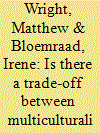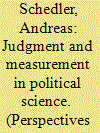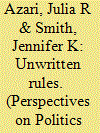|
|
|
Sort Order |
|
|
|
Items / Page
|
|
|
|
|
|
|
| Srl | Item |
| 1 |
ID:
113539


|
|
|
|
|
| Publication |
2012.
|
| Summary/Abstract |
Across immigrant-receiving democracies on both sides of the Atlantic, policies of "cultural recognition" (e.g., "multiculturalism") have become a convenient punching-bag for political elites. Among academics, heated theoretical debates exist over whether such policies foster or hinder immigrants' engagement with their adoptive nation. We provide a novel empirical assessment of this debate from the immigrant perspective. We ask how multicultural and citizenship policies influence immigrants' socio-political engagement with their adoptive nation in three realms: social inclusion, political inclusion, and political engagement. Using a variety of cross-national and single-country surveys, we show that multiculturalism in no case hinders engagement with society and government, and in many cases seems to foster it. Thus, the claim that multiculturalism undermines immigrants' socio-political integration appears largely without foundation.
|
|
|
|
|
|
|
|
|
|
|
|
|
|
|
|
| 2 |
ID:
113536


|
|
|
|
|
| Publication |
2012.
|
| Summary/Abstract |
Standard methodological advice in political science warns against the distortion of measurement decisions by judgmental elements. Judgment is subjective, common wisdom asserts, it produces opaque, biased, and unreliable data. This article, by contrast, argues that judgment is a critical intersubjective ingredient of political measurement that needs to be acknowledged and rationalized, rather than exorcised.
|
|
|
|
|
|
|
|
|
|
|
|
|
|
|
|
| 3 |
ID:
113537


|
|
|
|
|
| Publication |
2012.
|
| Summary/Abstract |
Scholars of the developing world have driven a surge of interest in unwritten or informal institutions as determinants of political outcomes. In advanced industrial democracies, by contrast, informal institutions often remain consigned to the analytic margins. This article makes a case for greater attention to informal political institutions in established democracies, and it introduces a theoretical framework to support such analysis. Informal institutions, understood as the unwritten rules of political life, are seen to perform three functions: they complete or fill gaps in formal institutions, coordinate the operation of overlapping (and perhaps clashing) institutions, and operate parallel to formal institutions in regulating political behavior. These three roles of informal institutions are associated with different characteristic patterns of institutional stability and change. The article illustrates its theoretical framework with case studies from American politics, the subfield in which formal-institutional analysis has flourished most. These cases are the historical norm of a two-term presidency (a completing institution), the unwritten rules of the presidential nomination process (coordinating institutions), the informal practice of obstruction in the Senate (a parallel institution), and the normative expectation that presidents should address the public directly (which performs all three functions).
|
|
|
|
|
|
|
|
|
|
|
|
|
|
|
|
| 4 |
ID:
113538


|
|
|
|
|
| Publication |
2012.
|
| Summary/Abstract |
Ascending to the presidency in the midst of a severe economic crisis and an ongoing war on terrorism, Barack Obama faced numerous political and policy challenges. We examine the responsibilities he faced in assuming the received tasks of modern presidential leadership amid a polarized political system. To a point, Obama has embraced partisan leadership, indeed, even further articulating developments in the relationship between the president and parties that Ronald Reagan had first initiated, and George W. Bush built upon. Thus Obama has advanced an executive-centered party system that relies on presidential candidates and presidents to pronounce party doctrine, raise campaign funds, mobilize grassroots support, and campaign on behalf of their partisan brethren. Just as Reagan and Bush used their powers in ways that bolstered their parties, so Obama's exertions have strengthened the Democratic Party's capacity to mobilize voters and to advance programmatic objectives. At the same time, presidential partisanship threatens to relegate collective responsibility to executive aggrandizement. Seeking to avoid the pitfalls that undermined the Bush presidency, Obama has been more ambivalent about uniting partisanship and executive power. Only time will tell whether this ambiguity proves to be effective statecraft-enshrining his charisma in an enduring record of achievement and a new Democratic majority-or whether it marks a new stage in the development of executive dominion that subordinates party building to the cult of personality.
|
|
|
|
|
|
|
|
|
|
|
|
|
|
|
|
|
|
|
|
|